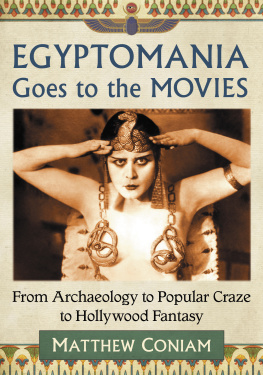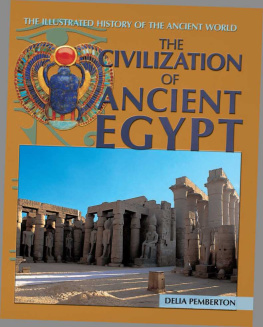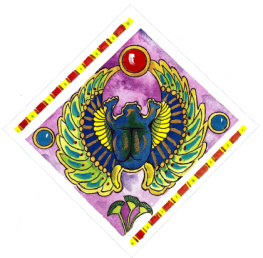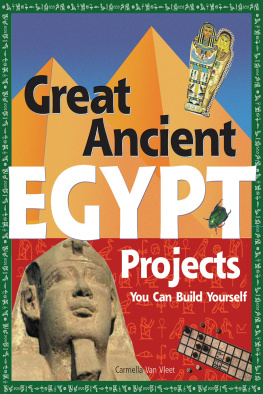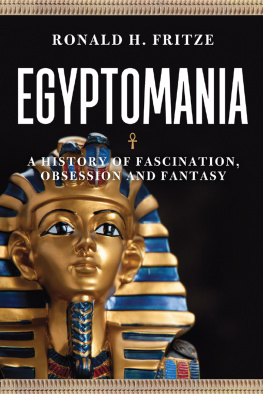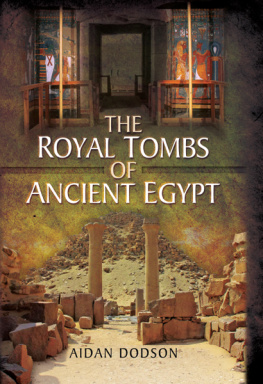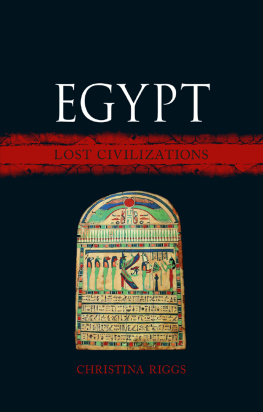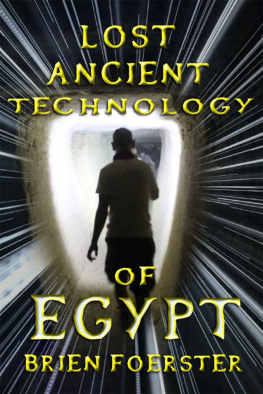EGYPTOMANIA

EGYPTOMANIA
A HISTORY OF FASCINATION,
OBSESSION AND FANTASY
RONALD H. FRITZE
REAKTION BOOKS
For Rudi Heinze. Teacher, Mentor and Friend.
Published by Reaktion Books Ltd
Unit 32, Waterside
4448 Wharf Road
London N1 7UX, UK
www.reaktionbooks.co.uk
First published 2016
Copyright Ronald H. Fritze 2016
All rights reserved
No part of this publication may be reproduced, stored in a retrieval system, or transmitted, in any form or by any means, electronic, mechanical, photocopying, recording or otherwise, without the prior permission of the publishers
Page References in the Photo Acknowledgements and
Index Match the Printed Edition of this Book.
Printed and bound in Great Britain by Bell & Bain, Glasgow
A catalogue record for this book is available from the British Library
eISBN: 9781780236858
CONTENTS

This advertisement for John Courage beer combines Egyptomania and imperialism. An intrepid British sailor has climbed the sublime height of the Great Pyramid to find a nice bottle of Amber Courage waiting for him.
INTRODUCTION
Why did he name his company Pyramid? asked Trout... Why would anybody in the business of highspeed transportation name his business and his trucks after buildings which havent moved an eighth of an inch since Christ was born?
The drivers answer was prompt. It was peevish, too, as though he thought Trout was stupid to have to ask a question like that. He liked the sound of it, he said. Dont you like the sound of it?
Trout nodded in order to keep things friendly. Yes, he said, its a very nice sound.
KURT VONNEGUT, Breakfast of Champions (1973)
W HAT IS EGYPTOMANIA? While that short question could be answered many ways and at great length, the simple answer is that Egyptomania is a fascination with ancient Egypt in its many aspects. It is a phenomenon that has existed for a long time, possibly for 3,000 years or more. Egyptomania can take a scholarly form, but it is also a widespread and persistent aspect of popular culture. In fact, although many people are interested in the history of ancient Egypt, more people are captivated by the Egypt of myth and legend. The goal of this book is to tell the story of the evolution of Egyptomania from its beginning, starting around 1000 BC with the ancient Hebrews and Greeks, and continuing up to the present. Although Egyptomania is a global phenomenon, this book will largely confine itself to Egyptomania in the West, while paying some attention to medieval Islamic Egyptomania. The focus of this book is on the fascination with both the myth and reality of ancient Egypt; although in the world of Egyptomania, myth reigns supreme. This aims to be a history of Egyptomania, not a history of Egyptology the academic study Instead, this book will primarily concentrate on the idea of Egypt and Egyptomania in popular culture.
The term Egyptomania could give the impression of being concerned with a form of mental illness. Some people who go to extremes with their interest in Egypt might well be mentally ill, and the name Egyptopaths has been suggested for them. For most people, fascination with Egypt is just that, an enjoyable interest in a manner similar to the way that other people enjoy golf, period melodramas such as Downton Abbey or NASCAR. Most peoples Egyptomania is harmless; however, some forms of it can indeed be sinister and even hateful. Nevertheless, when all is said and done, Egyptomania is not a pejorative term.
The phenomenon of Egyptomania also goes under alternative names. One of these is Egyptophilia, a synonym for Egyptomania that gets rid of the potentially derogatory term mania. Other terms include Egyptian Revival, Egyptianizing and Nile Style. But these terms are limited to discussions of the works of art, architecture and interior design that utilize Egyptian motifs. Another title that has been used is Pharaonism, which is a manifestation of Egyptian nationalism and was a movement popular in Egypt during the 1920s and 1930s. The movement was led by various Egyptian intellectuals who argued for a sense of national identity that had its foundation in the most ancient Egypt of the pharaohs. It rejected the idea of Egyptians identifying themselves primarily as Arabs or Muslims. There are also more specialized forms of Egyptomania such as Mummymania, a fascination with mummies; Tutmania, a fascination with King Tutankhamun (c. 13361327 BC) that stems from the discovery of his tomb in 1922 and which reappears whenever an exhibit of Tut artefacts goes on a world tour; and the less well-recognized Amarnamania, the fascination with the heretic pharaoh Akhenaten (13531336 BC) and the art and architecture of his era. The German scholar Eric Hornung has coined the term Egyptosophy for the idea that Egypt was the original source of wisdom and the heartland of the mystical traditions known as hermeticism. Fringe or pseudo-historical theories about ancient Egypt also have specialized terms for that version of Egyptomania. The polite term is Alternative Egyptology, but irritated mainstream Egyptologists sometimes prefer the definitely derogatory Pyramidiots.
So what might Egyptomania look like? My wife and I went on a personal Egyptomaniac quest back in the summer and autumn of 2001. That summer we were living in Beaumont, Texas, where I had taught at Lamar University for seventeen years until accepting a position in Arkansas. We were making preparations to move and were trying to lessen the amount of our possessions we would have to transport. At the same time, we were thinking about furniture that we wanted to buy once we got settled. Our new house included a cosy sitting/dining area that had a great view and we decided to put a couple of comfortable chairs in it. While still in Texas we were browsing the furniture department of the Dillards department store. There we saw just what we wanted: two comfortable wingback chairs. But what made these chairs truly special was the motif of the upholstery with a pattern of pyramids, camels, palm trees and sphinxes a cornucopia of images from ancient Egypt, what historians and interior design historians call Egyptianized artefacts (the artefact is non-Egyptian; its decor, however, strongly evokes ancient Egypt). Although these chairs, in the Cleopatra line, were what we wanted, we decided to wait to purchase them until after we had moved to Arkansas. Once there, we took a trip to the Dillards in Little Rock, but unfortunately the chairs were, in this store and others nearby, completely out of stock. Back in Texas, the Cleopatra chairs had also sold out. We never got our chairs. Our Egyptomania went unfulfilled.
What does my failed quest tell us about contemporary Egyptomania? First, Egyptianized artefacts are obviously popular. The Cleopatra chairs had sold out quickly everywhere. They were also distinctive enough that they had caught the attention of the sales people. Why were they so popular? I can only answer for my wife and myself in a manner similar to Kurt Vonneguts truck driver in our epigraph: we liked the look of the chairs. That begs the question, why did we like the Egyptianized look?
Various scholars commenting on the phenomenon of Egyptomania in popular culture have made the observation that at least some of ancient Egypts popularity is based on the fact that it is both comfortably familiar and intriguingly exotic at the same time.


